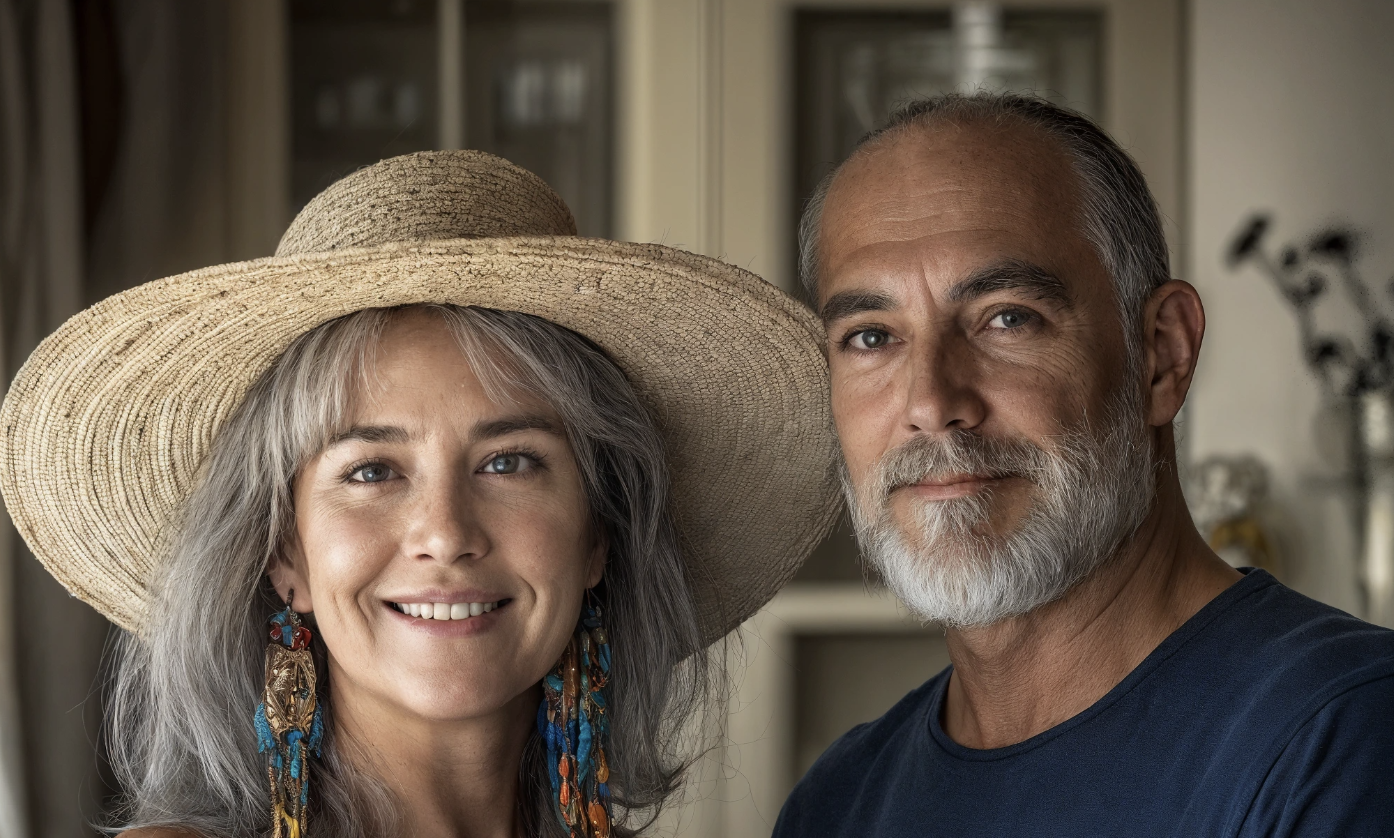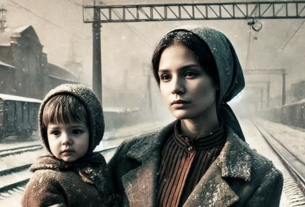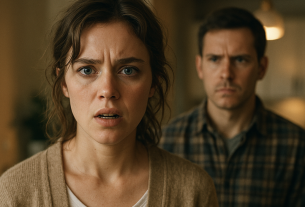Natalya looked at the documents calmly. For some reason, there was no anger either.
“So, you’ve really decided?” Vladimir looked at his wife with barely concealed irritation. “And what now? How are we going to divide things?”
Natalya raised her eyes. There were no tears, no pleas—only determination that had appeared after a sleepless night spent thinking about her ruined life.
“Take everything,” she said quietly but firmly.
“What do you mean ‘everything’?” Vladimir squinted skeptically.
“The apartment, the dacha, the car, the accounts. Everything,” she gestured around. “I don’t need anything.”
“Are you joking?” he started to smile. “Or is this some kind of female trick?”
“No, Volodya. No joke, no trick. For thirty years I put my life on hold. Thirty years I washed, cooked, cleaned, waited. Thirty years I heard that traveling is a waste of money, that my hobbies are frivolous, that my dreams are nonsense. Do you know how many times I wanted to go to the sea? Nineteen. Do you know how many times we went? Three. And all three times you grumbled that it was expensive and pointless.”
Vladimir snorted.
“There you go again. We had a roof over our heads, we had food…”
“Yes, we did,” Natalya nodded. “And now you will have everything else too. Congratulations on your victory.”
The lawyer watched the scene with undisguised surprise. He was used to tears, shouting, mutual accusations. But this woman was simply giving up everything people usually fight to the last drop for.
“Do you understand what you’re saying?” he quietly asked Natalya. “By law, you are entitled to half of the jointly acquired property.”
“I understand,” she smiled so brightly as if she had shed an invisible burden from her shoulders. “And I also understand that half of an empty life is just an empty life in miniature.”
Vladimir barely hid his glee. Of course, he hadn’t expected such a turn of events. He planned to bargain, maybe threaten, definitely manipulate. But here was a gift from fate!
“Now that’s adult behavior!” he slapped the table. “Finally, you showed some sense.”
“Don’t confuse sense with liberation,” Natalya replied quietly and signed the documents.
They drove home in the same car but as if from different planets.
Vladimir was softly humming to himself—seemed like a march or an old childhood song. The car gently rocked over bumps, and his whistle sometimes circled in the air, then suddenly stopped.
Natalya wasn’t listening—she hardly heard anything around her because her gaze was fixed on the cloudy window through which cheerful firs and pines rushed past, and her heart fluttered like a young bird taking its first flight.
How strange: an ordinary road, a tired evening, and suddenly—an inexpressible feeling of space inside. As if a heavy lump that had been there for a long time suddenly evaporated. Natalya smiled, touched her cool cheek with her fingers, and thought: this is it, this is freedom…
Sometimes a person only needs a single moment, a single glance through a window at the trees flying by in the distance—for life to burst into new, long-forgotten colors.
Three weeks later, Natalya stood in the middle of a small room in Klin.
The rented accommodation looked modest: a bed, a wardrobe, a table, and a small TV. On the windowsill sat two pots with violets—the first independent purchase in the new place.
“You’re really crazy,” her son Kirill’s voice sounded on the phone with clear irritation. “You just dropped everything and moved to this dump?”
“I didn’t drop it, son,” Natalya calmly corrected him. “I left it. Those are two different things.”
“Mom, but how? Dad said you gave him everything willingly. Now he’s even planning to sell the dacha—says he doesn’t want so much hassle by himself.”
Natalya smiled, looking at herself in the small mirror on the wall. For a week now, she had been wearing a new haircut she would never have dared to get when Vladimir was around. “Too youthful,” “unprofessional,” “what will people say”—the usual phrases echoed in her memory.
“Let him sell it,” she agreed lightly. “Your father always knew how to manage the property.”
“What about you? You have nothing left!”
“I have the most important thing left, Kirill. My life. And you know what’s surprising? It turns out at fifty-nine you can start it over.”
Natalya took a job as an administrator at a small private nursing home for elderly people. The work was not easy but interesting. And most importantly—new acquaintances appeared and free time she now managed herself.
Meanwhile, Vladimir was reveling in his victory.
For the first two weeks, he walked around the apartment like the owner of a new castle, looking at everything with a sense of complete possession. No one would scold him anymore, no one would remind him about unwashed socks or dirty dishes.
“You’re lucky, Volodya,” said his friend Semyonych, sipping cognac in the kitchen. “Other men lose half or more, and you—you’re in chocolate! The apartment, the dacha, the car—all yours.”
“Yeah,” Vladimir smirked smugly. “Finally, Natalya showed some sense. Apparently, she realized she’d be lost without me.”
By the end of the first month, the euphoria began to give way to the first inconveniences.
Clean shirts strangely stopped appearing in the wardrobe. The fridge gaped empty, and cooking a proper meal turned out harder than imagined. At work, colleagues began noticing Vladimir looked less tidy than before.
“You look drawn, Vladimiryich,” the department head remarked. “Everything alright at home?”
“More than alright,” Vladimir replied cheerfully. “Just some minor household reorganization.”
One evening he opened the fridge and found only a bottle of ketchup, a pack of processed cheese, and an opened bottle. His stomach betrayed him with a growl, reminding him that Vladimir had only managed a sandwich that morning.
“Damn it,” he muttered, slamming the door with visible irritation. “This can’t go on… Something has to be done.”
As if escaping these thoughts, Vladimir immediately ordered food—what else, without delivery, if the fridge was again like a spring steppe: empty, with only a few wilted green shoots on the bottom shelf. While waiting for the courier, he habitually sorted through a pile of bills. And there, like a cold shower, the numbers hit him: utilities, internet, card payments, electricity…
Before, it all seemed some background fuss, a problem from a parallel reality. Probably happens like this: as long as someone is around, life just happens. You don’t notice expenses, don’t think—just live.
Then a persistent ring sounded—as if dragged from a whirlpool of thoughts. The courier handed him the package and the terminal.
“Five hundred eighty rubles,” came the even tone.
“What?!” Vladimir jumped, almost dropping his keys. “For what, excuse me, for stew and water?”
“Well… standard price these days,” shrugged the courier, looking like someone who hears such surprise a hundred times a day.
He paid silently, returned to the apartment, and stopped at the kitchen door. All was quiet. Even the fridge hummed tensely, as if lonely. The apartment was large, with trendy lamps and mirrors, with all the things he had once dreamed of… But now it seemed just a waiting room. Cold. Empty. So huge that the wind could howl in the hallway—just like in Vladimir’s soul.
Natalya stood on the shore of the Black Sea, facing the sun and salty wind.
Around her bustled a group of similarly “aged” tourists—the active retirees club had organized a week-long trip to Crimea. For the first time in her life, she traveled without constant reminders of money “wasted,” without grumbling and calculations of how much could be saved by staying home.
“Natalya, come take a picture!” called her new friend Irina, an energetic sixty-year-old widow whom she’d met in a painting class.
Natalya happily ran to the group lined up for a group photo. Who would have thought you could wear a bright sundress, let your hair down, and laugh like a girl at her age?
“And now a selfie!” Irina commanded, pulling out a long phone stick. “And let’s definitely post it in the group!”
In the evening, sitting in her room, Natalya looked through the photos. There was a woman with shining eyes and a happy smile—a woman she barely recognized. When had that ever-tense crease between her brows disappeared? When had her shoulders straightened and her movements gained lightness?
“I should post these on social media,” Natalya said to herself and, after a moment’s hesitation, published several pictures on her almost forgotten profile.
Meanwhile, in Moscow, Vladimir was struggling with a burst pipe in the kitchen. Water flooded the floor, ruined a nightstand, and the plumber he called indifferently reported, “They don’t make those anymore,” and the whole riser would have to be replaced.
“What the hell!” Vladimir swore, wiping the wet floor with old towels. “Where’s that damn plumber’s number? Natalya always knew who to call.”
Suddenly he realized that his wife had kept dozens of phone numbers in her memory—from the plumber to a good hairdresser, from a trusted butcher at the market to a reliable shoe repairman. That invisible frame of household comfort collapsed in one moment, leaving him alone with problems that had previously been solved as if by magic.
“Damn pipe!” he threw the wet rag down with rage. “And I have to cook, and wash, and that damn job too…”
That evening, when the water was finally shut off and the puddle somehow cleaned up, Vladimir remembered that he hadn’t been on social media for a long time. Out of boredom, he started scrolling his feed and suddenly froze—the screen showed Natalya’s joyful face against the sea. She was in a bright sundress, with a new haircut and looked… happy?
“What nonsense,” he muttered, zooming in on the photo. “She left practically penniless!”
Comments under the photo only increased his confusion:
“Natalyushka, so young in the photo!”
“You look great, girlfriend!”
“The sea suits you!”
He scrolled further and found even more surprising things: some gatherings in a library, a group of people with easels in the park, Natalya with a bouquet of wildflowers sitting on a bench.
“What the hell,” Vladimir put down the phone and looked around the empty kitchen with dirty dishes in the sink. “She was supposed to… was supposed to…”
He couldn’t finish the sentence because suddenly he realized—he really expected Natalya to suffer without him, without all that he considered important. But in the photos was a completely different woman—as if she had shed years and found freedom.
A few days later, the dacha roof started leaking. A storm was coming, and the attic needed urgent covering.
“Semyonych, help me!” he begged on the phone. “Bring some nails at least, I can’t manage alone.”
“Sorry, Vovchik,” came the reply. “My mother-in-law is in the hospital, I’m with her. Listen, why don’t you call Natalya? She always helped you.”
“She…” Vladimir faltered. “She left.”
“Left? Where to?”
“Just left,” Vladimir cut off. “Okay, I’ll manage myself.”
But managing turned out harder than he thought. Rain drummed on the roof as he cursed while trying to stretch a tarp over the leaking area. Suddenly his foot slipped, and Vladimir rolled down, screaming. Falling to the ground, he felt a sharp pain in his ankle.
“Sprained ligaments, lucky you,” a young doctor at the emergency room said indifferently. “Could have been worse. A week of rest, keep your leg elevated.”
“A week?” Vladimir grimaced in pain. “And who will do the repairs? My roof is leaking!”
“That’s your problem,” the doctor shrugged, writing a prescription. “Let your wife take care of it, and you lie down.”
Vladimir wanted to argue but stayed silent.
He spent three days completely alone, barely moving around the apartment on crutches. The ordered food ran out and was expensive anyway. Attempts to cook something himself failed—standing by the stove on one leg was almost impossible.
On the fourth day, he couldn’t take it and called his son.
“Kirill, hi,” he started in an overly cheerful voice. “How are you?”
“Fine, Dad,” his son’s voice was cautious. “Something wrong?”
“No, just…” Vladimir hesitated. “I have a minor injury, leg. Maybe you could drop by and help the old man?”
There was a pause.
“Sorry, Dad, I’m in St. Petersburg on a business trip. Back in three days.”
“Ah… okay,” disappointment stuck in his throat. “No matter, I’ll manage.”
“Listen,” Kirill said hesitantly, “have you called Mom? She could…”
“No!” Vladimir sharply cut him off. “Why call her? I’m doing just fine.”
He hung up first and threw the phone on the couch. Absurd pride wouldn’t let him admit he missed Natalya, her care, her presence at home. Before, he never noticed how much she did—simply because everything was done quietly, without noise or demands for gratitude.
A week and a half later, Vladimir finally managed to walk without crutches. First thing, he went to the dacha to assess the storm damage. The sight was depressing—the attic ceiling was covered with mold spots, the favorite sofa was hopelessly ruined, and the air smelled musty.
“What the hell,” he muttered, sitting on a bench in the garden.
The apple trees, which Natalya had always cared for, stood neglected. The high grass almost hid the paths she had lovingly laid out with stones. Everything seemed orphaned without her caring hands.
On the way back, he stopped at a roadside café. Tired and upset, Vladimir ordered borscht and compote. The first spoonful unexpectedly caused a lump in his throat—the borscht was nothing like Natalya’s, too sour and tasteless.
“Are you okay, sir?” a passing waitress asked sympathetically.
“Yes, just…” he couldn’t find words. How to explain that a simple borscht suddenly reminded him of a whole life he had lost?
Back home, Vladimir sat in silence for a long time, looking at photos on the shelf. Here they were young, smiling against the Kremlin. Here was a family photo where Kirill was still small. Here was their twentieth wedding anniversary…
“What a fool I am,” he whispered, looking at his wife’s happy face in the old photo.
Summoning courage, Vladimir took the phone and wrote a message. But the reply was nothing like he expected.
Natalya had moved to a seaside town. New friends laughed around her, music played, and life—real life—finally belonged to her completely.
At almost sixty, she had finally begun to live.



